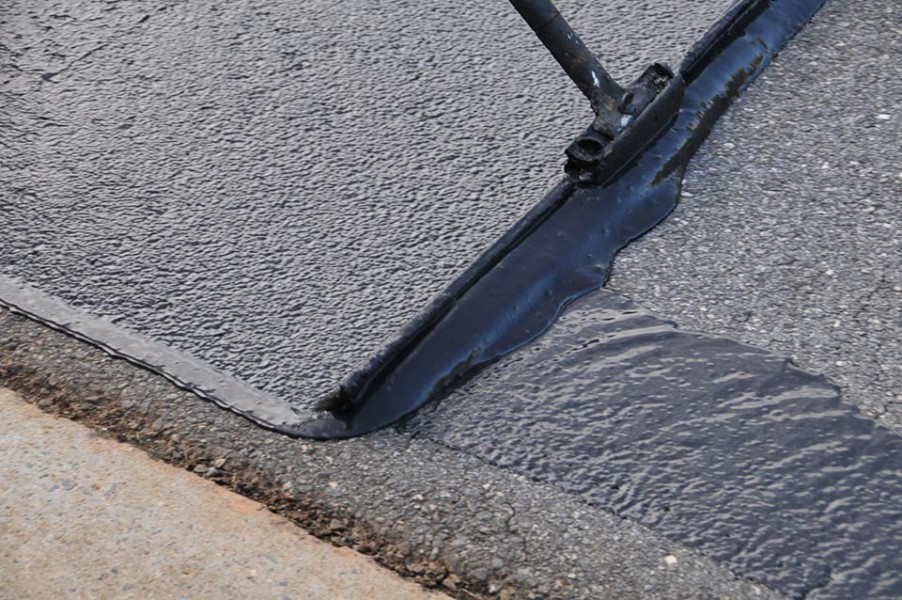Unlock the Secrets of Asphalt Sealing: Maximizing Hot Mix Asphalt Durability
Warm Mix Asphalt: A Lasting Remedy for Sidewalk
Warm Mix Asphalt (HMA) has become a leading lasting option for pavement services, providing a myriad of cutting-edge innovations and environmental advantages. Its capability to recycle products and lower energy usage offers a compelling instance for its fostering in roadway construction tasks. The long-lasting efficiency and sturdiness of HMA make it a recommended option for infrastructure advancement. As the need for eco-friendly construction practices grows, exploring the nuances of HMA's sustainability can give beneficial insights into the future of pavement remedies.
Ecological Benefits of Warm Mix Asphalt

In Addition, Hot Mix Asphalt helps to mitigate metropolitan heat island results. Its dark shade soaks up sunshine, decreasing the quantity of heat mirrored back right into the ambience contrasted to lighter-colored sidewalks. This can lower ambient temperatures in city areas, reducing the demand for a/c and ultimately lowering energy usage.
On top of that, Warm Mix Asphalt contributes to enhanced stormwater management. Its porous nature allows water to infiltrate the pavement and recharge groundwater products, minimizing drainage and the danger of flooding. These environmental benefits make Warm Mix Asphalt a lasting selection for paving freeways and roads.
Energy Performance in HMA Production
Is power efficiency a crucial factor in the manufacturing of Hot Mix Asphalt (HMA)? Definitely. Power plays a considerable role in the manufacturing of HMA, impacting both cost and environmental sustainability. One crucial aspect of power effectiveness in HMA production is using warm mix asphalt (WMA) innovations (regrading). WMA enables the mixing and positioning of asphalt at reduced temperature levels compared to standard warm mix asphalt, causing reduced power usage throughout production. This procedure not only reduces gas use however also reduces greenhouse gas exhausts, making it an extra eco-friendly choice.
In addition, improvements in plant innovations have actually caused even more energy-efficient HMA manufacturing processes. Modern plants are created with features like recycled asphalt pavement (RAP) processing capacities, effective heater systems, and enhanced insulation, all adding to energy savings. By optimizing energy usage in HMA production, the sector can minimize its carbon impact while preserving high-grade pavement products. Power effectiveness is, consequently, a critical consideration in guaranteeing the sustainability of Warm Mix Asphalt production.
Recyclability of Hot Mix Asphalt
The recyclability of Hot Mix Asphalt (HMA) is a critical aspect of its sustainability and lasting ecological impact. HMA is among the most recycled products in the USA, with over 100 million lots of recovered asphalt sidewalk (RAP) being recycled yearly in brand-new pavement building. Reusing HMA offers numerous environmental benefits, such as decreasing the requirement for virgin products, decreasing energy intake during manufacturing, and reducing the amount of waste sent out to garbage dumps.
The process of reusing HMA involves crushing the existing sidewalk, crushing it into smaller sized pieces, and blending it with new aggregate and asphalt binder to develop a recycled mix. This recycled mix can typically do along with or even far better than redirected here conventional HMA, while needing less resources and producing lower greenhouse gas exhausts. By incorporating RAP into new pavement projects, road agencies can save natural deposits, minimize expenses, and decrease the environmental footprint of road construction and maintenance tasks. Overall, the recyclability of HMA plays a substantial duty in promoting sustainable techniques within the pavement market.

Long-Term Performance of HMA
Asphalt pavements demonstrate resilience and durability over an extensive duration, showing the lasting performance of Hot Mix Asphalt (HMA) Additionally, innovations in HMA innovation, such as the use of polymer-modified binders and warm mix asphalt, have additionally boosted the resilience and durability of HMA pavements. By prioritizing high quality building and construction and upkeep techniques, HMA proceeds to confirm itself as a lasting and cost-effective remedy for long-lasting pavement facilities.

HMA: Toughness and Sustainability
Demonstrating both longevity and sustainability, Warm Mix Asphalt (HMA) has actually become a keystone in the construction of long-lasting sidewalk infrastructures - angled parking. HMA's longevity comes from its capacity to endure hefty tons, more helpful hints severe climate condition, and high traffic quantities, making it a trustworthy option for roads, freeways, and airport terminal paths. The make-up of HMA, which commonly includes aggregates, binder, and filler, plays a crucial duty in boosting its long life and resistance to damage
Moreover, HMA's sustainability depends on its recyclability and energy-efficient manufacturing process. The capability to reuse redeemed asphalt pavement (RAP) in new HMA blends minimizes the demand for virgin materials and reduces the ecological impact of sidewalk building and upkeep. Additionally, the energy efficiency of creating HMA depends on its lower mixing temperature levels contrasted to various other sidewalk products, causing decreased power usage and greenhouse gas emissions.
Final Thought
In verdict, hot imp source mix asphalt (HMA) provides a sustainable option for sidewalk with its environmentally friendly features. HMA's recyclability, energy performance in production, and long-lasting resilience make it an environmentally friendly choice for roadway building.
HMA is one of the most recycled materials in the United States, with over 100 million heaps of redeemed asphalt sidewalk (RAP) being recycled annually in new pavement construction.The procedure of recycling HMA includes milling the existing sidewalk, crushing it into smaller pieces, and mixing it with brand-new aggregate and asphalt binder to create a recycled mix.Asphalt pavements demonstrate durability and strength over an extensive period, showing the long-term performance of Hot Mix Asphalt (HMA) Furthermore, advancements in HMA technology, such as the usage of polymer-modified binders and cozy mix asphalt, have further boosted the durability and durability of HMA sidewalks. The ability to reuse redeemed asphalt sidewalk (RAP) in brand-new HMA blends lowers the need for virgin materials and reduces the environmental influence of pavement construction and maintenance.